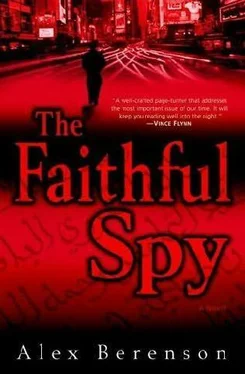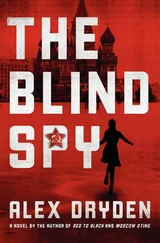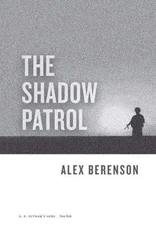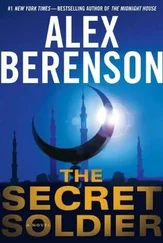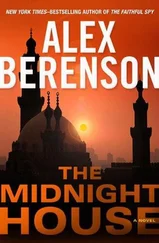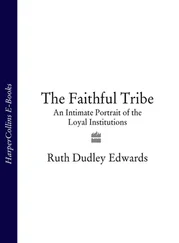Alex Berenson - The Faithful Spy
Здесь есть возможность читать онлайн «Alex Berenson - The Faithful Spy» весь текст электронной книги совершенно бесплатно (целиком полную версию без сокращений). В некоторых случаях можно слушать аудио, скачать через торрент в формате fb2 и присутствует краткое содержание. ISBN: , Жанр: Шпионский детектив, на английском языке. Описание произведения, (предисловие) а так же отзывы посетителей доступны на портале библиотеки ЛибКат.
- Название:The Faithful Spy
- Автор:
- Жанр:
- Год:неизвестен
- ISBN:1-58836-542-5
- Рейтинг книги:3 / 5. Голосов: 1
-
Избранное:Добавить в избранное
- Отзывы:
-
Ваша оценка:
- 60
- 1
- 2
- 3
- 4
- 5
The Faithful Spy: краткое содержание, описание и аннотация
Предлагаем к чтению аннотацию, описание, краткое содержание или предисловие (зависит от того, что написал сам автор книги «The Faithful Spy»). Если вы не нашли необходимую информацию о книге — напишите в комментариях, мы постараемся отыскать её.
The Faithful Spy — читать онлайн бесплатно полную книгу (весь текст) целиком
Ниже представлен текст книги, разбитый по страницам. Система сохранения места последней прочитанной страницы, позволяет с удобством читать онлайн бесплатно книгу «The Faithful Spy», без необходимости каждый раз заново искать на чём Вы остановились. Поставьте закладку, и сможете в любой момент перейти на страницу, на которой закончили чтение.
Интервал:
Закладка:
Al Qaeda, “the Base” of the revolution, had never recovered from the loss of its own base in Afghanistan, Wells thought. When the Taliban fell, Qaeda’s troops fled east to the North-West Frontier, the mountainous border of Pakistan and Afghanistan. Wells had narrowly escaped an American bomb at Tora Bora, the last big fight of the Afghan war. He liked to imagine that the bomb had been guided by Glen Holmes, who had swung it away from the hut where Wells hid.
But the United States hadn’t closed the noose at Tora Bora, for reasons Wells had never understood. Thousands of jihadis escaped. In 2002, they reached the mountains of the North-West Frontier, so named by the British, since the area was the northwest border of colonial India. The North-West Frontier was a wild land ruled by Pashtuns, devout Muslims who supported Qaeda’s brand of jihad, and was effectively closed to Pakistani and American soldiers. Even the Special Forces could operate there only for short stretches.
So Qaeda survived. But it did not thrive. Osama and his lieutenants scurried between holes, occasionally releasing tapes to rouse the faithful. Every few months the group launched an attack. It had blasted a train station in Madrid, blown up hotels in Egypt and subways in London, attacked oil workers in Saudi Arabia. In Iraq, it fought the American occupiers. But nothing that had shaken the world like September 11.
Meanwhile Wells and his fellow jihadis eked out a miserable existence. In theory, Qaeda’s paymasters had arranged for Pashtun villagers to house them. In reality, they were a burden on desperately poor families. They had to earn their keep like everyone else. Wells and the half dozen Arabs living in this village, just outside Akora Khatak, survived on stale bread and scraps of lamb. Wells did not want to guess how much weight he had lost. He had hardly recognized himself the few times he had seen himself in a mirror. The bullet hole in his left arm had turned into a knot of scar tissue that ached unpredictably.
The winters were especially difficult, even for Wells, who had grown up playing in the Bitterroot Range on the Montana-Idaho border. The cold sank into his bones. He could only imagine what the Saudis thought. Lots of them had been martyred in these mountains, but not from bombs or bullets. They’d died of pneumonia and altitude sickness and something that looked a lot like scurvy. They’d died asking for their mothers, and a few had died cursing Osama and the awful place he’d led them. Wells ate fresh fruit whenever he could, which wasn’t often, and marveled at the toughness of the Pashtuns.
To keep sane he practiced his soldiering as much as possible. The local tribal leader had helped him set up a small firing range on flat ground a few miles outside the village. Every few weeks Wells rode out with a half dozen men and shot off as many rounds as he could spare. But he couldn’t pretend he was doing anything more than passing time. They all were. If America vs. Qaeda were a Pop Warner football game, the refs would have invoked the mercy rule and ended it a long time ago.
Gul stepped into the crowd of worshippers. He looked at the men around him and spoke again, his voice low and intense. “The time for speeches is done, brothers,” he said. “Allah willing, we will see action soon. May Allah bless all faithful Muslims. Amen.”
The men clustered close to hug the sheikh. Waiting his turn, Wells wondered if Gul knew something or was just trying to rally the congregation. He poked with his tongue at a loose molar in the back of his mouth, sending a spurt of pain through his jaw. Dental care in the North-West Frontier left something to be desired. In a few weeks he would have to visit the medical clinic in Akora to have the tooth “examined.” Or maybe he’d just find a pair of pliers and do the job himself.
Lately Wells had dreamed of leaving this place. He could hitch a ride to Peshawar, catch a bus to Islamabad, and knock on the front gate of the American embassy. Or, more accurately, knock on the roadblocks that kept a truck bomb from getting too close to the embassy’s blastproof walls. A few minutes and he’d be inside. A couple days and he’d be home. No one would say he had failed. Not to his face, anyway. They’d say he had done all he could, all anyone could. But somewhere inside he would know better. And he would never forgive himself.
Because this wasn’t Pop Warner football. The mercy rule didn’t exist. The men standing beside him in this mosque would happily give their lives to be remembered as martyrs. They were stuck in these mountains, but their goal remained unchanged. To punish the crusaders for their hubris. To take back Jerusalem. To kill Americans. Qaeda’s desire to destroy was limited only by its resources. For now the group was weak, but that could change instantly. If Qaeda’s assassins succeeded in killing Pakistan’s president, the country might suddenly have a Wahhabi in charge. Then bin Laden would have a nuclear weapon to play with. An Islamic bomb. And sooner or later there would be a big hole in New York or London or Washington.
Anyway, living here had a few compensations. Wells had learned the Koran better than he ever expected. He had a sense of how monks had lived in the Middle Ages, copying Bibles by hand. He knew now how one book could become moral and spiritual guidance and entertainment all at once.
After so many years in Afghanistan and Pakistan, Wells found that his belief in Islam — once just a cover story — had turned real. The faith touched him in a way that Christianity never had. Wells had always been skeptical of religion. When he read the Koran at night on his bed alone he suffered the same doubts about its promises of paradise as he did when he read the apostles’ description of Christ rising from the dead. Yet he loved the Koran’s exhortations that men should treat one another as brothers and give all they could to charity. The umma, the brotherhood, was real. He could walk into any house in this village and be offered a cup of hot sweet tea and a meal by a family that could barely feed its own children. And no one needed a priest’s help to reach the divine in Islam; anyone who studied hard and was humble could seek enlightenment for himself.
But Islam’s biggest strength was its greatest weakness, Wells thought. The religion’s flexibility had made it a cloak for the anger of men tired of being ruled by America and the West. Islam was the Marxism of the twenty-first century, a cover for national liberation movements of all stripes. Except that the high priests of Marxism had never promised their followers rewards in the next world in exchange for their deaths in this one. Wahhabis like bin Laden had married their fury at the United States with a particularly nasty vision of Islam. They wanted to take the religion back to the seventh-century desert. They couldn’t compete in the modern world, so they would pretend that it didn’t exist. Or destroy it. Their anger resonated with hundreds of millions of desperately poor Muslims. But in Wells’s eyes they had perverted the religion they claimed to represent. Islam wasn’t incompatible with progress. In fact, Islamic nations had once been among the world’s most advanced. Eight hundred years ago, as Christians burned witches, the Muslim Abbasids had built a university in Baghdad that held eighty thousand books. Then the Mongols had come. Things had gone downhill ever since.
Wells kept his views to himself. Publicly, he spent hours each day studying the Koran with Sheikh Gul and the clerics at the village madrassa. His Qaeda superiors had taken notice. And that was the other reason Wells stayed in the North-West Frontier. He believed that he had at last convinced Qaeda’s leadership of his loyalty; the other jihadis in the village had begun to listen to him more carefully. Or so he hoped.
Читать дальшеИнтервал:
Закладка:
Похожие книги на «The Faithful Spy»
Представляем Вашему вниманию похожие книги на «The Faithful Spy» списком для выбора. Мы отобрали схожую по названию и смыслу литературу в надежде предоставить читателям больше вариантов отыскать новые, интересные, ещё непрочитанные произведения.
Обсуждение, отзывы о книге «The Faithful Spy» и просто собственные мнения читателей. Оставьте ваши комментарии, напишите, что Вы думаете о произведении, его смысле или главных героях. Укажите что конкретно понравилось, а что нет, и почему Вы так считаете.
